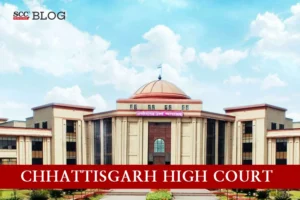Chhattisgarh High Court: In a petition filed to challenge the constitutional validity of Section 16(4) of the Central Goods and Services Tax Act, 2017 (‘the CGST Act’) as violative of Articles 14, 19(1)(g) and 300-A of the Constitution, the Division Bench of Sanjay K. Agrawal and Radhakishan Agrawal, JJ., opined that Input Tax Credit (‘ITC’) was a nature of benefit or concession extended to the dealer and it could be availed by the beneficiary as per the scheme of the statute, subject to fulfilment of the conditions provided in Section 16(4) of the CGST Act and therefore, Section 16(4) of the CGST Act, could not be held violative of Article 14 of the Constitution. Thus, the Court opined that the provisions contained in Section 16(4) of the CGST Act was not violative of Articles 14, 19(1)(g) and 300-A of the Constitution and dismissed the present petition.
Background
In an instant case, the petitioner was a proprietorship firm, registered under the CGST Act and was engaged in the trading of oils and allied products. Further, the petitioner being a registered firm, was required to furnish its monthly return under Section 39 of the CGST Act read with Rule 61 of the Central Goods and Services Tax Rules, 2017 (‘the CGST Rules’). The petitioner filed return for the financial year 2018-2019, under Section 39 of the CGST Act for March, 2019. The return was specifically filed for the specified period and late fees as per Section 47 of the CGST Act and interest under Section 50 of the CGST Act was also paid in return for March, 2019.
Thereafter, the petitioner was served with the demand letter dated 06-02-2020, by Respondent 3, demanding an amount of Rs.9,43,919 to be paid and alleged that the ITC was availed in contravention of Section 16(4) of the CGST Act, along with the interest under Section 50 of the CGST Act. Respondent 3 again issued a demand letter dated 28-01-2021 and stated that the Section 16(4) of the CGST Act provided the condition of availing ITC and accordingly, demanded the payment of wrongly availed ITC along with appropriate interest. The petitioner further replied that he had satisfied all the requirements of Section 16(2) of the CGST Act. However, the petitioner was again served with the show cause notice that he had wrongfully availed ITC for March, 2019 by contravening with the provisions of Section 16(4) read with Section 39 of CGST Act and Rule 61 of the CGST Rules.
The petitioner was required to show cause as to why total goods and service tax should not be demanded and recovered from him under Section 73(1) of the CGST Act, interest at applicable rate should not be demanded and recovered under Section 50 of the said Act and the penalties should not be imposed under Section 73(9) of the CGST Act.
Thus, the petitioner filed the instant writ petition to question the constitutional validity of Section 16(4) of the CGST Act and eventually questioning the proceedings initiated for recovery of Rs. 9,43,920 along with interest and penalties stating that the said recovery under Section 16(4) was violative of Articles 14, 19(1)(g) and 300-A of the Constitution. Further, the petitioner stated that Section 16(4) was merely procedural in nature which could not override substantive conditions mandated under Sections 16(1) and 16(2) of the CGST Act.
Analysis, Law, and Decision
The Court relied on R.K. Garg v. Union of India, (1981) 4 SCC 675; Kailash Chandra v. Mukundi Lal, (2002) 2 SCC 678; Twyford Tea Co. Ltd. v. State of Kerala, (1970) 1 SCC 189 and State of M.P. v. Rakesh Kohli, (2012) 6 SCC 312 and opined that it was quite vivid that the power of the legislature especially in fiscal statute was very wide and could only be challenged on the ground that it lacked legislative competence and infringed or took away any of the fundamental rights.
The Court relied on Godrej and Boyce Mfg. Co. (P) Ltd. v. CST, (1992) 3 SCC 624; India Agencies (Regd.) v. CCT, (2005) 2 SCC 129 and State of Karnataka v. M.K. Agro Tech (P) Ltd. (2017) 16 SCC 210; Jayam & Co. v. CST (2016) 15 SCC 125, and opined that the ITC was a nature of benefit or concession extended to the dealer and it could be availed by the beneficiary as per the scheme of the statute subject to fulfilment of the conditions laid down in Section 16(4) of the CGST Act. Thus, the Court opined that Section 16(4) of the CGST Act, could not be held violative of Article 14 of the Constitution.
Further, regarding the question that whether a proprietorship firm, could claim protection under Article 19(1)(g) of the Constitution, the Court opined that petitioner was only a proprietorship firm and not a citizen and therefore, could not claim protection of Article 19(1)(g) of the Constitution. Thus, the Court opined that the ground claiming protection of Article 19(1)(g) was not available to the petitioner, which was a proprietorship firm.
Thus, the Court opined that the provisions contained in Section 16(4) of the CGST Act was not violative of Articles 14, 19(1)(g) and 300-A of the Constitution and the petitioner had failed to made a case to question the constitutional validity of Section 16(4) of the CGST Act as it was a constitutionally valid piece of legislation. However, the Court opined that the petitioner was free to pursue the show cause notice issued to him on 20-05-2022, and dismissed the present petition.
[Jain Brothers v. Union of India, 2023 SCC OnLine Chh 5493, Order dated 11-12-2023]
Advocates who appeared in this case :
For the Petitioner: Palash Soni, Advocate;
For the Respondents: Ramakant Mishra, Deputy Solicitor General of India and Anmol Sharma, Advocate; Amrito Das, Additional Advocate General; Ashutosh Singh Kachhawaha and Shruti Pramar, Advocates.
Amicus Curiae: Neelabh Dubey, Advocate

